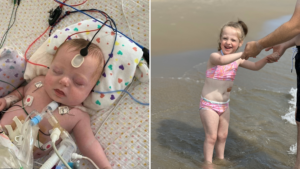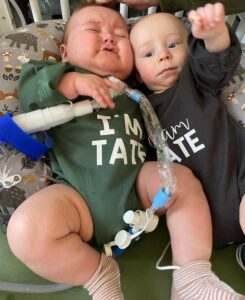Mom Kateri Morton (right) was featured on ABC-47 with son Joey (left) to advocate for increased funding for DE’s PDN program

Hearts for Home Care super-advocate and super-mom Kateri Morton was recently featured on ABC-47 alongside her 8-year-old son Joey and his long-time nurse Diane to advocate for better state Medicaid reimbursement rates. To date, Delaware has not raised reimbursement rates for the state’s private duty nursing (PDN) program in 16 years. As funding for this important program falls behind rising costs of living and providing healthcare services, it’s families like Kateri’s that ultimately suffer.
“Most of our nurses have either left or stopped working in that area because of their own health factors. Or they had to go to different jobs for employment,” says Kateri. Home care agencies rely on the state’s reimbursement rate to provide nurses’ wages, supplies, training, and benefits. The 16-year stagnation has driven nurses to seek employment in hospitals and other facilities that can afford to pay nurses more in wages. As agencies struggle to recruit and retain enough caregivers, families experience more unfilled nursing shifts, sleepless nights, and struggles maintaining employment.
The COVID-19 pandemic has only exacerbated the issue, as staffing issues have limited nurses’ ability to care for high-risk clients and as precious personal protective equipment (PPE) has raised providers’ everyday costs. Nurse Diane says, “We’re struggling. We can’t retain our nurses, and with COVID going on, more and more families are being touched by home care nursing.”
One of the most compelling aspects of the reimbursement rate issue in Delaware and across the US is that increasing families’ access to home care would save state Medicaid programs significant funding dollars that currently go toward care that residents receive in ERs, hospitals, and other facilities.
The key to getting this issue on the top of legislators’ minds is to increase the number of affected family members who speak out and advocate on behalf of themselves and their children. Kateri’s network of DE moms and other guardians have shared their unique stories and struggles with one another, and with Delaware’s decision-makers. Recently, Kateri secured meetings with Delaware’s Medical Advisory Committee and the Department of Health and Social Services. “Advocating for Joey has empowered me. Without nursing, I can’t provide financially, physically, and emotionally to my fullest,” says Kateri. “As mothers of medically fragile children… when there is an opportunity to show an elected official how important this care is, that story paints a picture that a million facts and statistics cannot.”
Kateri recently created a Facebook group for DE families interested in advocacy. Check out her group and Hearts for Home Care to join others in advocacy opportunities today!







